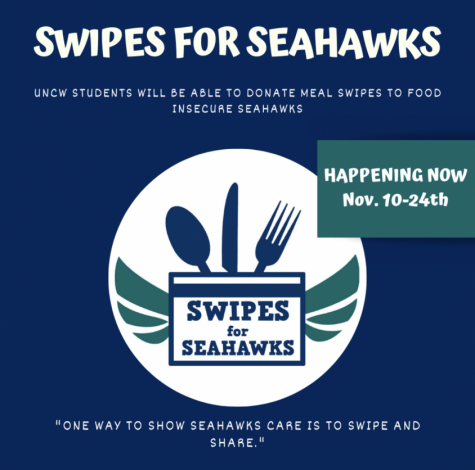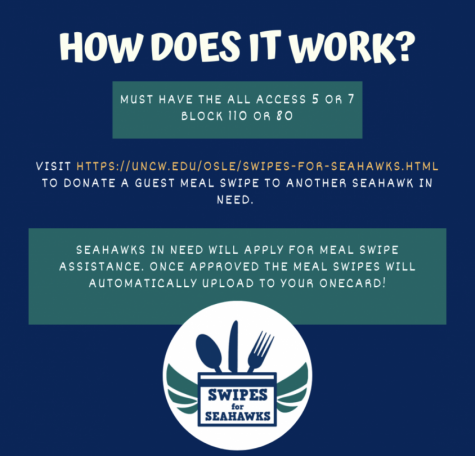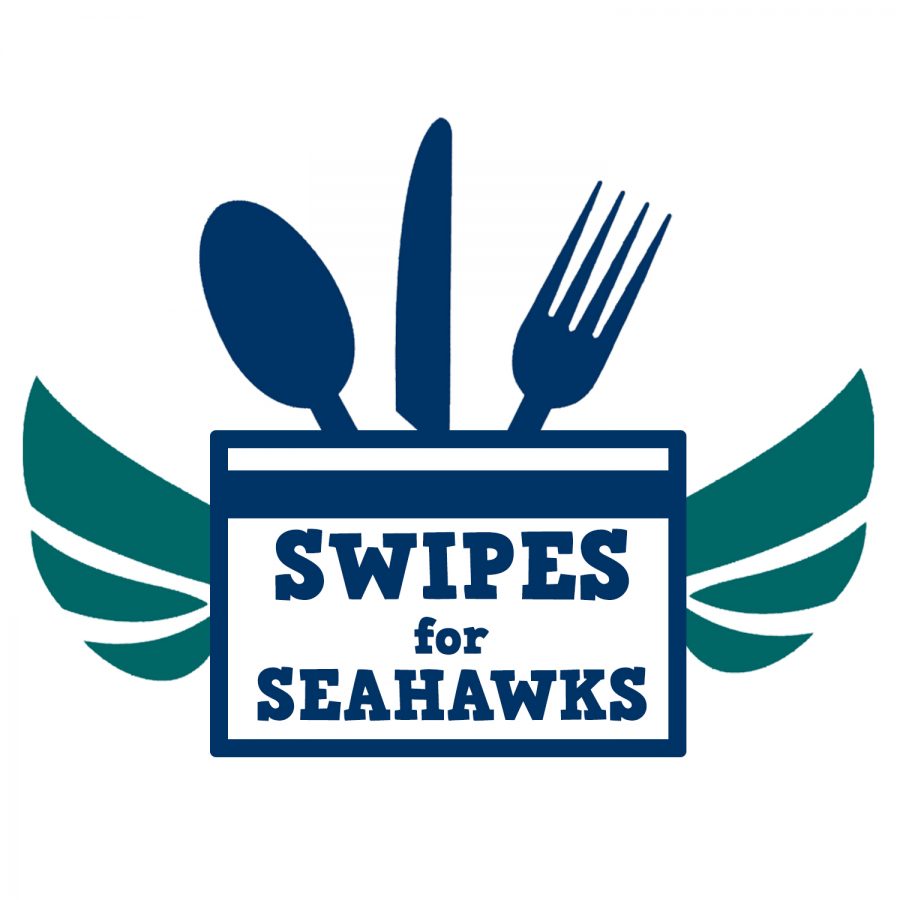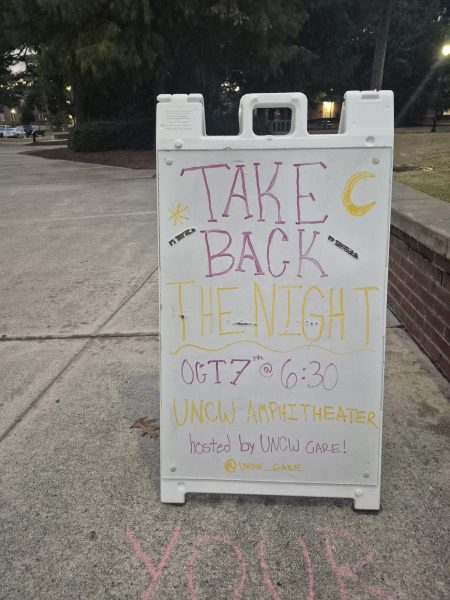Swipes for Seahawks allows students to donate meal swipes to food-insecure classmates
Logan Massengill
Swipes for Seahawks allows UNCW students to donate one guest swipe per semester to food insecure students.
During their sophomore year at UNC Wilmington (UNCW), Robby Fensom, Logan Massengill and Cassidy Montgomery began working on a project for their LED 411 (Contemporary Leadership Applications) class.
Together they came up with the idea to create a meal donation program at UNCW. This project then grew outside the bounds of the course to becoming an actual program on campus.
According to their webpage on UNCW’s website, “5.5% of UNCW students who were food insecure indicated that they would benefit from having access to meals on campus.” Their goal is to play some part in helping address the issue of food insecurity on campus.
While working on their project last year they created and sent out a survey to better gauge the need for a program like this and what food insecurity looked like on UNCW.
“So we created a survey and sent it out to everybody. We were like, if we were able to start a program would you be able to donate a meal,” Montgomery said. “Then we asked questions like, do you know if food insecurity is big on campus, and if they were aware that we actually have a food pantry on campus because that kind of goes hand in hand with our goal and everything.”
Massengill added that they received over 150 responses and they all overwhelmingly said they would donate or use a program like this. Fensom said they also used more empirical research like an article about food-insecurity and college student’s on the Office of Leadership and Engagement’s (OLSE) website and Swipe out Hunger’s website.
“When it comes to the written work, there’s a project proposal that’s on the books now. So administrators know how the program is going to function. [They] have a place to work from for future semesters that say here’s what the drives are going to look like, here’s the stakeholders we’re going to involve [and] maybe a little bit of the parameters of what we’re shooting for,” Fensom said. “Obviously COVID has thrown everything off and our numbers are going to look different depending on future semesters.
“So we’re trying to be as flexible as possible with that, it’s going to be interesting to see next semester what the use is of the program because obviously, people’s incomes have been drastically impacted by COVID. So potentially, we might see an unfortunate scenario where we have perhaps less swipes and a greater than typical need for the program. So we’re doing our best to kind of anticipate those and pivot around what the need is.”

Swipes for Seahawks officially started on Nov. 10 and will run through the remainder of the semester on Nov. 24.
“We knew that there was already a food pantry on campus for students to access, it’s right next to the water tower,” Massengill said. “But we had surveyed students, and we realized that may not be accessible for some students, or some students just don’t want to go there because they don’t want to be seen going there and utilizing those resources. So we really wanted to make a program where people would be able to donate their extra meal swipes because it’s relatively easy thing to do.”
Students with the following meal plans, All Access 5, All Access 7, Block 110, or Block 80, are all eligible to donate one guest meal per semester to a fellow Seahawk in need.
“The guest swipes attached to certain meal plans, they have no monetary value, and they’re not attached to a fiscal year,” Massengill said. “So if students don’t use them, they’re just kind of like wasted, essentially. So that is what the program is, you’re not actually donating one of your teal meals, you’re donating one of your guest swipes, so it’s only applicable for certain meal plans that have guest swipes.”
So far, Swipes for Seahawks has already collected 55 meal swipes which will be distributed in the spring semester. Their goal for the end of the donation period is 100, but they said they were all very proud of what had been donated so far because 55 meals are no small feat.
There were several logistical hoops that had to be figured out along the way to help bring this program to fruition. Collaborating with Aramark and Auxiliary Services were the biggest challenges they had to overcome.
“It was a matter of creating a system where people will be able to get the swipes off of their one cards and put them in this pool where people that were food insecure and or on high financial aid are able to take from that pool of donated swipes to be able to put on their one card,” Massengill said. “So they don’t have to go up to the register and be like, ‘Hey, I’m food insecure, can I get an extra meal.’ It takes away that whole step in the process and they’re just floated right on their card. So even if they don’t have a meal plan, they can still use their one card to just swipe and get a meal when they want.”
Another conversation they had to have and consider was how the meal swipes would be distributed to food-insecure students.
“That was another big part of the conversation and that’s specifically being done with the Office of the Dean of Students, Amy, Hector is a case manager there,” Fensom said. “So her office is going to be responsible for having conversations with people, taking in those forums and being the decider of who gets swipes. One of the portions of that conversation that was particularly helpful is UNC Charlotte, for the past two or three years has had a functioning program. So we were able to communicate with them and they’ve been really helpful for giving the insight into what does this look like?”

Their goals moving forward are to increase awareness of the program, get more people to donate meal swipes and eventually expand the program to also implement donations of food dollars.
“As this program grows, we also want to use it as an awareness project for food insecurity on campuses,” Fensom said. “The reality is no single program is going to be able to combat something as pervasive as food insecurity. But there’s other programs on campus like Hawks Harvest that can help with this and so even just the knowledge that it’s an issue is important. As the program grows, we’re going to see stuff hopefully, where maybe different student groups compete to donate the most amount of swipes.”
UNCW students who are experiencing food insecurity and are interested in receiving meal swipes from this program can apply and enroll through an online application. Each case will be reviewed and followed-up by Hector, the Case Manager in the Office of the Dean of Students.
To learn more and donate you can visit the Swipes for Seahawks page on UNCW’s website.









